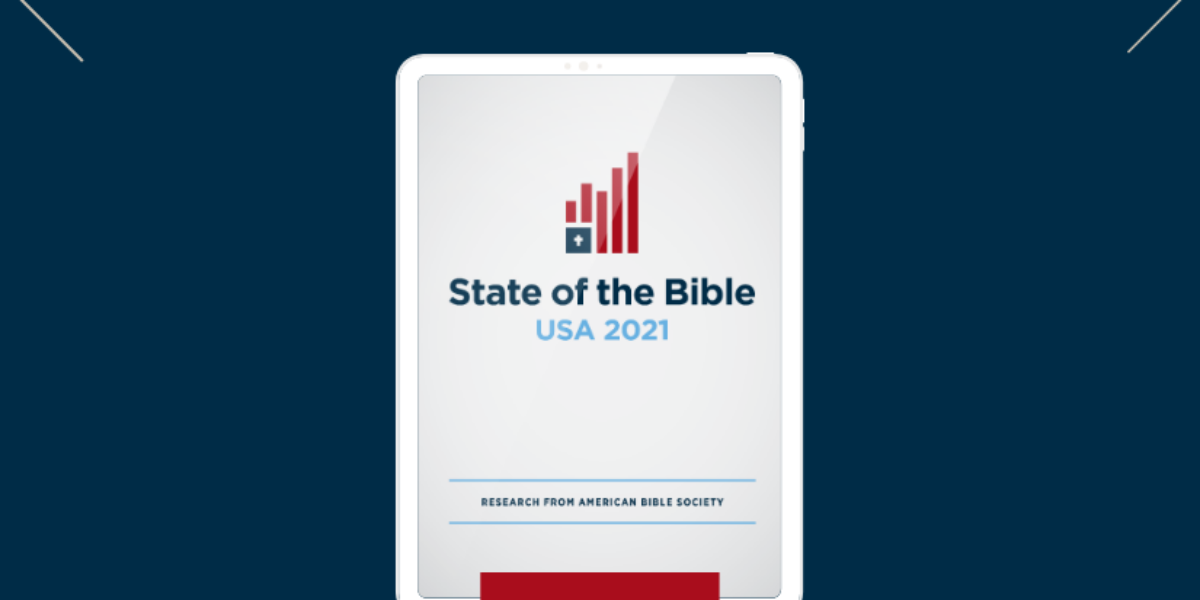American Bible Society today released the third chapter of their 11th annual State of the Bible report, which highlights cultural trends in the U.S. regarding spirituality and Scripture engagement. Today’s release shows that Americans are finding comfort in Scripture and report a tendency to envision a more hopeful future when they regularly read the Bible. The first three chapters are currently available to download at StateoftheBible.org.
“In the midst of all the trauma and stress we are facing, there is hope: Americans are finding comfort in Scripture,” said John Farquhar Plake, PhD and director of ministry intelligence for American Bible Society. “While being part of the Church doesn’t mean hardships disappear, our study found that when Americans are rooted in Scripture, we are better able to forgive and to cope with trauma or stress. We’re seeing in real time how the Bible shows us that our story does not end with hurt and pain—we have hope beyond our suffering. As people consistently interact with truth found in the Bible, they see a way forward toward a brighter, more hopeful future.”
The findings come from data collected and analyzed by American Bible Society in January 2021, in which 3,354 American adults from all 50 states and the District of Columbia completed online surveys, with an additional 91 responses from Gen Z youth. For this year’s report, American Bible Society will release nine chapters throughout the year. The third chapter, Hope for the Hurting, analyzes Americans’ heightened experiences of stress and trauma over the past year, and examines how the Bible brings hope to hurting people.
Key findings analyzed in Chapter 3: Hope for the Hurting
- One-quarter of Americans are experiencing moderate levels of stress and ten percent of Americans are facing stress at extremely high levels. Half of American adults are experiencing moderate or severe difficulty in either falling or staying asleep. Reports of this stress-related problem are up four percentage points in 2021, compared to June of 2020 (page 64).
- Every stress symptom has increased since June 2020 (page 64). The increased experience of stress symptoms has led to an overall increase in stress scores across the nation. In June 2020, the average respondent scored a 12 on the stress scale. Today, U.S. adults have a mean score of 14, an increase of 17-percent since June. High stress scores are more likely among young, female, and Black or Hispanic respondents (page 66).
- Though Scripture Engaged* people experience stress at average levels, they over-index for hope. They exhibit significantly higher levels of hope than either the Movable Middle* or the Bible Disengaged*, which gives clues to how the Bible helps them cope with stress and look toward the future with expectancy (page 70).
The relationship between trauma and forgiveness
- Trauma incidence is higher for women. Over half of women have experienced some form of trauma (51%) compared to 44 percent of men (page 71). Women are significantly more likely than men to say the trauma they have experienced still impacts them today (page 72).
- Severity of trauma is also experienced differently across Scripture Engagement segments*. Those who are Scripture Engaged have felt more severe trauma effects than the Movable Middle and Bible Disengaged, potentially because people turn to the Bible when they are hurting. For instance, women are more likely to be trauma victims and are more likely to be Scripture Engaged than men (page 73).
- A strong relationship with the Bible often coexists with the hardships of life. Being rooted in the Bible does not preclude tough circumstances but may provide respite and hope in spite of them (page 76).
- The severity of trauma has no statistical relationship to the ability to forgive. Even those who have experienced the worst, longest-lasting trauma are about as likely to forgive as those who have experienced less trauma. However, Scripture Engagement is significantly related to evidence of forgiveness. The more Scripture Engaged a person is, the more likely they are able to forgive others (page 77).
Between July and December 2021, American Bible Society will release six additional chapters in the State of the Bible story, including reports on how Americans are inspired by the Bible to be “good neighbors”; the connection between holistic health and the Bible; how Gen Z understands the Bible and faith; and the relationship between the Bible, money, and generosity.
To download the first three chapters of the State of the Bible 2021 ebook, visit StateoftheBible.org.
*For descriptions on how Scripture engagement was measured and reported, please see page 30 of the ebook available for download at StateoftheBible.org.





